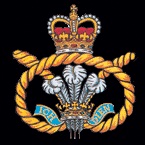Staffordshire Regiment
| Staffordshire Regiment (The Prince of Wales') | |
|---|---|

Collar badge of the Staffordshire Regiment
|
|
| Active | 1959–2007 |
| Country |
|
| Branch |
|
| Type | Infantry |
| Role | Armoured Infantry |
| Size | One Battalion |
| Part of | Prince of Wales' Division |
| Nickname(s) | The Staffords |
| Colors | Black & Gold |
| March | Quick – The Staffordshire Regiment Slow – God Bless the Prince of Wales |
| Mascot(s) | Staffordshire Bull Terrier, each successive mascot called Watchman |
| Anniversaries | Anzio (22 January), Ypres (31 July), Arnhem (17 September), Ferozeshah (21 December) |
| Disbanded | 2007 |
| Commanders | |
| Colonel in Chief | HRH The Duke of York |
| Colonel of the Regiment |
Brigadier James Kenneth Tanner OBE |
| Insignia | |
| Tactical Recognition Flash |  |
| Arm Badge | Glider From South Staffordshire Regiment |
The Staffordshire Regiment (Prince of Wales') (or simply "Staffords" for short) was an infantry regiment of the British Army, part of the Prince of Wales' Division. The regiment was formed in 1959 by the amalgamation of the South Staffordshire Regiment and the North Staffordshire Regiment (Prince of Wales'), and in 2007 was amalgamated with the Cheshire Regiment and the Worcestershire and Sherwood Foresters Regiment to become the 3rd Battalion, Mercian Regiment.
In 2014, the 3rd Battalion, Mercian Regiment was merged with the 1st and 2nd battalions, to create the 1st and 2nd battalions, Mercian Regiment (Cheshires, Worcesters and Sherwood Foresters, and Staffords).
The mascot of the Staffordshire Regiment was a Staffordshire Bull Terrier. Each successive mascot holding the name Watchman. The current serving mascot is called Sgt Watchman V, who carries out his duties as part of the Staffordshire Regimental Association.
The regiment was formed on 31 January 1959 by the amalgamation of the South Staffordshire Regiment and North Staffordshire Regiment (Prince of Wales').
In 1962 the regiment undertook a six-month exercise in Kenya, followed by a year in Colchester and then a return to Kenya for a further two years. On the tour the regiment had to deal with a mutiny by the Ugandan Army. Returning home the regiment was the last unit of the British Army to serve in East Africa.
A home tour in Dover followed in 1964. Then came a two-year posting to Berlin in 1968 followed by a tour in Sharjah in the Persian Gulf where the regiment again recorded a 'last unit' distinction being the last unit to serve in Sharjah.
...
Wikipedia
